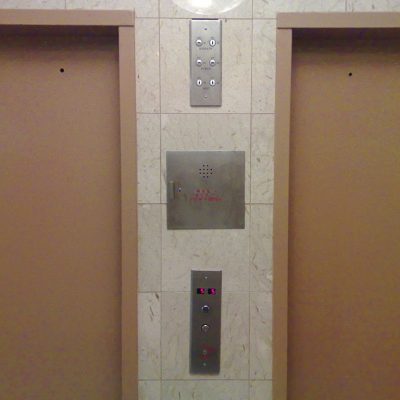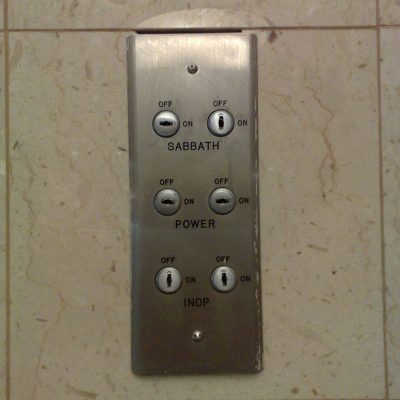Activating “Sabbath Mode” on a GE refrigerator disables interior lights, display panels, alarms and beeps as well as ice and water dispensers. In that mode, opening the door triggers no changes, including normal cooling processes to compensate for temperature loss. So why would anyone want to disable such key functionality on a home appliance?
“The observance of the Sabbath and religious holidays in Judaism requires a restriction on certain activities during holy times,” explains GE Appliances — and some of those Halakha (Jewish law) restrictions involving turning things on and off, or even adjusting settings on electrical devices. So the company works “with third party kosher certification agencies … to develop Sabbath Mode features” for many of its appliances, including ovens and dishwashers.
It gets complicated quickly, but in essence: various prohibitions forbid certain sects of Judaism from working (in any capacity) on the Sabbath. For observers, this can apply to anything from making fires and preparing food to pushing buttons and flipping switches. “For decades,” explains Dan Levin in a New York Times article, “Orthodox Jews trudged through their houses in a pre-Sabbath ritual of turning off home security systems, taping down the button that turns on the light inside the refrigerator when the door is opened, and lighting a flame to leave burning on the stove so food can be heated.” Some Jewish people also ask non-observant friends (or hired individuals) to flip switches and carry things for them, but this practice can be controversial. Such “sabbath goys” have included some very famous people.
But in recent years, large established companies as well as smaller startups and innovative entrepreneurs in the kosher gadget industry have begun to rethink cars, phones, alarms, microwaves, lamps, coffee machines and other everyday gadgets and technologies.
A number of big appliance makers have adapted major product lines, adding new options. “Manufacturers like Whirlpool and Viking have put Sabbath mode settings on most of their ovens, refrigerators, and even wine cellars,” writes Levin, and “General Electric introduced its Sabbath mode in 2000 … the special setting is featured on more than 150 of its wall ovens, ranges and other cooking appliances.”
Smaller companies have also designed specialty products explicitly around. There are lamps, for instance, that are made to be left on continuously, but feature movable parts for variable illumination — shifting a lamp shade is permitted, but turning a light on or off is not.
 Other creations address non-technological rules as well. In response to a prohibition regarding permanent writing on the Sabbath, rabbis, scientists and engineers of the Zomet Institute created specialized pens with ink that disappears after a few days. It sounds like a simple thing — not writing for a day now and then — but imagine, for example, the implications for medical records at a hospital. Zomet has also developed compliant locks, wheelchairs, phones, keyboards, baby monitors, cow-milking machines — and the list goes on.
Other creations address non-technological rules as well. In response to a prohibition regarding permanent writing on the Sabbath, rabbis, scientists and engineers of the Zomet Institute created specialized pens with ink that disappears after a few days. It sounds like a simple thing — not writing for a day now and then — but imagine, for example, the implications for medical records at a hospital. Zomet has also developed compliant locks, wheelchairs, phones, keyboards, baby monitors, cow-milking machines — and the list goes on.
Some solutions also highlight internal debates about what is permitted. Consider Shabbat elevators, for instance. In practice, these are built to function in various ways — some go all the way to the top, then descend floor by floor; others stop at each floor in both directions; still others stop on alternating floors. But in all cases, buttons are disabled, so no circuits are closed and no floor numbers are displayed. There are arguments, however, that adding weight to the elevator changes its operations, and thus represents a violation. On the way up, extra energy is deployed to raise a lift. On the way down, a person’s mass aids in the elevator’s descent, indirectly saving electricity.
As this one particular technology illustrates, there are disagreements about what devices and use cases are acceptable, and attempting to interpret historical traditions in modern contexts can be challenging. Regardless of ongoing debate, though, there seems to be a market for novel kosher solutions to these ancient religious restrictions.





Comments (4)
Share
Love this. In certain heavily Jewish parts of Los Angeles the traffic lights go into a special Shabbat mode at weekends. They work as if someone is always pressing the “Walk” button but no one did.
I love this podcast and all the article you provide.
You do a great job of explaining “Sabath Mode” but as a Sabbath-observant Jew, it felt like the essence of the design of our Sabath day got a bit distilled for me and my family this is how it feels:
Once a week, our family sits down together for a very special Sabbath meal.
We make this gathering as beautiful as we can, backlighting the room with the glow of burning candles and setting our dining room table with nice china and flatware laid out on top of a gold-trimmed tablecloth. We enjoy our favorite foods, usually chicken soup, salads, long rice, roasted chicken and large, fresh-baked home-made rolls. It’s kind of like a weekly thanksgiving feast.
Hands down, it’s the best time of the whole week because when we are at the table, the rest of the world outside our family is put on hold, there are no phones or electronics to distract us from being with each other; no screens to avert eye-contact, no texts intrusions or background noise from YouTube or PBSKids. It doesn’t matter if it’s an angry boss or an important client, publishers clearinghouse or the KGB.
Thirteen years and we have never missed a meal.
Actually, it’s more than a meal, being Jewish and Sabbath observant, from Friday to Saturday sundown to sundown we have this wonderful time where we can disconnect from the world and reconnect with each other, we turn the volume down on life and enjoy the silence, a detox from the past week that refreshes us for the week to come.
It may sound like a frightening proposition -going a whole day without checking Netflix, box scores or email or cycling through the various messages on social media. We don’t bide our time with errands house chores either. We love it though. I find it so centering. It’s a reminder that I don’t have to control everything. The world can wait for me at sundown.
This mindset spills into the rest of my life during the week; I don’t always have to rush, phone calls can wait if my wife is speaking with me, texts go ignored if I’m reading with my children.
Thank you for allowing me the space to talk about Sabbath beyond eruv structures and appliance modifications- to get to the core of why we do it all.
Shabbat Shalom.
Amazing how people will cling to the most idiotic ideas just because they think that will get them to some imaginary afterlife promised to them by some imaginary supernatural being.
It’s interesting in a technological sense how these products have been redesigned to allow breaking of those rules without technically breaking the rules (using the refrigerator, elevator, adjusting lighting, etc.) but if you’re going to such lengths to break the rules while not technically breaking the rules, why bother trying to follow those rules in the first place?